The Great Intrigue of Emmanuel-Joseph Sieyès
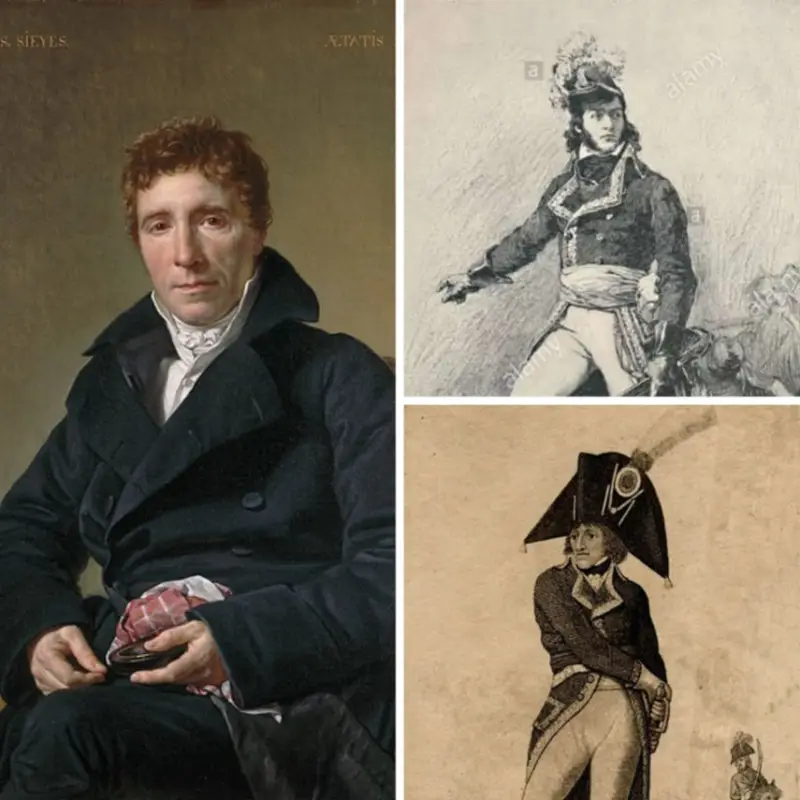
В previous article we talked about the origins and early life of Emmanuel-Joseph Sieyès, his revolutionary career. We ended our story with the message that, while acting as ambassador of the French Republic in Berlin, he managed to achieve the preservation of Prussian neutrality. Today we will talk about how Sieyès decided to lead a conspiracy against the Directory, his search for a “strong man with a sword” - and his unsuccessful choice, his fate after the coup of 18–19 Brumaire in the VIII year of the Republic.
Triumphant return to Paris
In May 1799, Sieyès, while still in Berlin, allowed himself to be persuaded to accept the post of one of the directors - he was elected to replace the dismissed Jean-François Reubelle (who, by the way, initiated the closure of the Jacobin Club). He arrived in Paris in June - and the capital greeted him with volleys of salutatory guns. He was given the Luxembourg Palace as his residence. Talleyrand wrote that everyone was sure that Sieyès
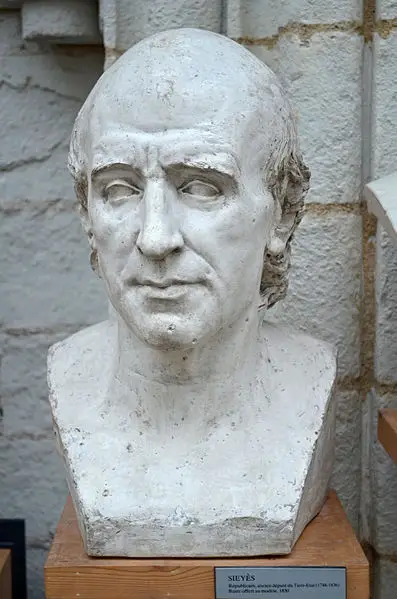
David d'Angers. Sieyes
And, indeed, Sieyès found “remedies for internal and external ills.” True, not exactly what many expected.
Sieyès's first sword
Meanwhile, the Directory was rapidly losing authority. It almost fell back in 1797, when the pro-monarchist party of the Clichy Club won the elections to the Council of Elders and the Council of Five Hundred (in May of that year). Its leaders were such strong politicians as the "director" Balthazar François Barthelemy, the Minister of War Lazare Nicolas Marguerite Carnot and the popular general Charles Pichegru, who became president of the Council of Five Hundred.
Another “director”, Barras, turned to the commander of the Italian army, Bonaparte, for help, and he sent Charles Pierre Augereau, an ardent republican, to the capital, who immediately declared that he had “arrived to kill the royalists.” At the head of 10 thousand soldiers, Augereau dispersed the deputies sitting in the Tuileries on September 4, 1797, arresting many of them, including Pichegru. The election results were annulled.
But Sieyès, who returned to Paris, saw that during his absence the situation had only gotten worse, and the fate of the Directory was literally hanging by a thread. And then he decided that if the Directory could not be saved, it was necessary, without waiting for a coup d’etat, to organize it himself. Sieyès turned his attention to Barthelemy Joubert, whom Bonaparte, in a letter to the Directory, called “undaunted” and “an excellent general ... who could always be seen at the head of attacking columns.”
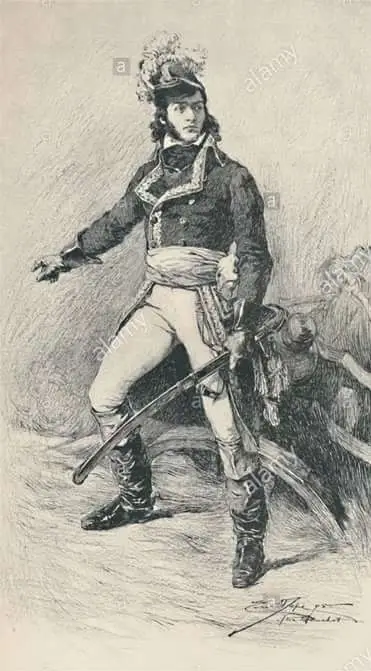
Barthelemy joubert
By that time, this young and very popular general, both in the army and in Paris, had already managed to command the Batavian and Sambro-Meuse armies, and then also captured Piedmont (part of the Sardinian kingdom), but came into conflict with officials sent there by the Directory. He was dismissed and then returned to service, but with a demotion: he became commander of the 17th division. However, it was precisely this division that comprised the entire garrison of the French capital.
Joubert was very ambitious, but was only interested in military affairs and was a layman in “big politics.” And therefore Sieyès offered him the secondary role of “consul of war,” while he himself was going to become a lifelong “great elector,” whose powers and powers were close to those of the royal one.
Joubert was ready to help the “patriot Sieyès” “restore order” in Paris and France, declaring:
At the beginning of the summer of 1799, a plan for a coup d'etat had already been drawn up, but at a decisive moment Joubert left Paris, going to the active army - to Italy.
The fact is that French affairs there were very bad. In the battles against Suvorov, the talented generals Moreau and MacDonald were defeated, Joubert was appointed to the role of savior of the Fatherland. Sieyès did not object, since he counted on the quick triumphant return of this general to Paris - the capital was literally supposed to fall at the feet of the winner.
However, on August 15, 1799, Joubert died at the very beginning of the Battle of Novi, in which three French generals were captured by Suvorov - Dominique Perignon (future marshal and vice-president of the Senate), Louis Leonard Antoine de Colli-Ricci and the well-known Emmanuel Grushi (who received four wounds in this battle). In Paris, the news of the defeat at Novi and the death of Joubert caused fear and confusion, and 5 days of mourning were declared. English newspapers had already published cartoons showing Suvorov entering Paris or leading “directors” in chains to St. Petersburg.
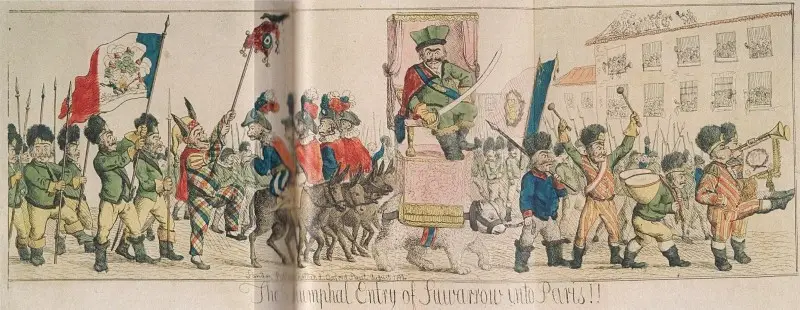
W. Holland. Suvorov's triumphant entry into Paris
However, instead of marching on Paris, the Austrians sent Suvorov to Switzerland, where, according to the plan of the well-known Franz Veruther (the author of the disposition of the Battle of Austerlitz), he was supposed to unite with Rimsky-Korsakov’s corps - literally in front of the experienced French general Andre Massena. Massena did not wait for the approach of Suvorov's army: he defeated the troops of Rimsky-Korsakov and the small detachment of the Austrian general Friedrich von Gotz (against whom the future Marshal Soult acted) - and Suvorov found out about this after the St. Gotthard Pass and the Devil's Bridge were taken .
Now we had to forget about the campaign against Paris; we had to save the army. Massena, as you know, failed to block the path of the Russian troops and defeat them. But he did not let them enter France, for which he was officially declared the “Savior of the Fatherland.”
Bonaparte's appearance
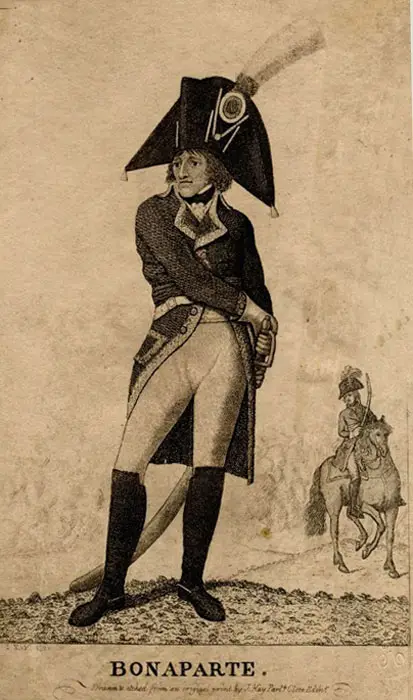
The difficult transition of Suvorov's army ended on September 30, 1799. And on October 9, the frigate Muiron entered the port of Frejus, and General Bonaparte, who had left his army in Egypt, set foot on French soil. Together with him, military leaders returned to France, whose names would soon thunder throughout Europe - Berthier, Murat, Junot, Lannes, Duroc, Bessieres, Marmont, Eugene Beauharnais.

Johan Hendry Louis Meyer. Return of Bonaparte from Egypt to France on October 9, 1799
Already on October 16, Napoleon arrived in Paris, where he publicly declared to Barras' envoy:
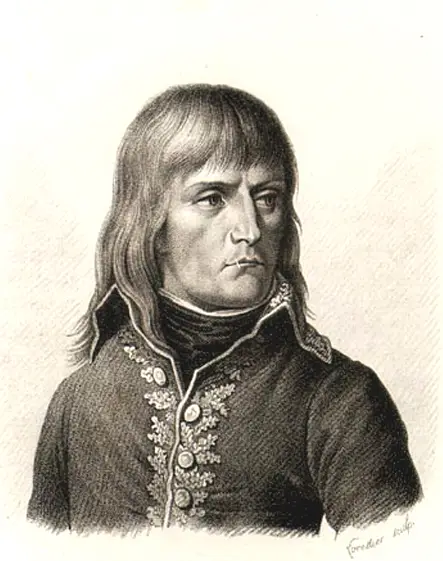
Bonaparte in a portrait by A. Tardieu
Sieyès initially tried to replace Joubert with Jean-Victor Moreau, who in Paris and France, after the death of Lazare Gauche, was considered Napoleon's only rival. However, this general did not want to “leave the soil of the law.” But when Bonaparte showed up in Paris, Moreau said to Sieyès:
Sieyes did not like this Corsican, but there was no one else to choose from. He entered into negotiations with Napoleon, Talleyrand and Fouche became intermediaries. Sieyès naively believed that this young Corsican, like Joubert, would be content with the role of his “sword.”
Meanwhile, Napoleon’s obvious and very great desire to “save his homeland” did not please some deputies of the Council of Five Hundred, who demanded that this general be put on trial for leaving the army without permission. Others suggested that he be prosecuted for violating the law on the mandatory 40-day quarantine that all arrivals from the East were required to serve.
Bonaparte's former friend Bernadotte, who had recently resigned from his post as Minister of War, pointedly refused to meet with him, saying:
In addition, in Paris there were generals known for their strong republican convictions - Bernadotte, Moreau, Jourdan. It was unknown how they would react to Bonaparte's apparent seizure of power. Soult, Ney, Grouchy and Lefebvre, who then commanded the garrison of Paris, served in the armies of the Republicans Moreau, Jourdan, Kleber and Gauche. And the officers of these armies did not like the commanders of the Italian army, in which Bonaparte “made a name for himself.”
However, General Moreau clearly stated to Napoleon on November 8:
Lefebvre, having received a Damascus steel saber brought by Bonaparte from Egypt as a gift, was so moved that he himself suggested drowning in the Seine “the lawyers who had latched on to power.” And later he wrote to Mortier:
The Minister of Foreign Affairs, Charles-Maurice Talleyrand, the Minister of Police Joseph Fouché, and generals Murat, MacDonald and Surerrier also sided with Sieyès and Bonaparte. Jourdan and Bernadotte at the decisive moment limited themselves to verbal protests.
Coup d'état 18–19 Brumaire, Year VIII of the Republic
On the first day of the coup, November 9, 1799, everything went surprisingly smoothly. “Directors” Guillot and Moulin were captured and placed under house arrest. Another “director” - Barras, realizing that the force was not on his side, did not dare to resist. He gave up the fight so quickly that Talleyrand, who came to him, did not even have time to offer a bribe of several million francs: shrugging his shoulders, the former bishop with a clear conscience appropriated this money for himself.
Troops loyal to Bonaparte took control of the Luxembourg Palace, Versailles, and Saint-Cloud. However, the next day, November 10, the Council of Five Hundred and the Council of Elders suddenly refused to “dissolve themselves.” Brother Lucien, who held the post of the Council of Five Hundred, did not help either.
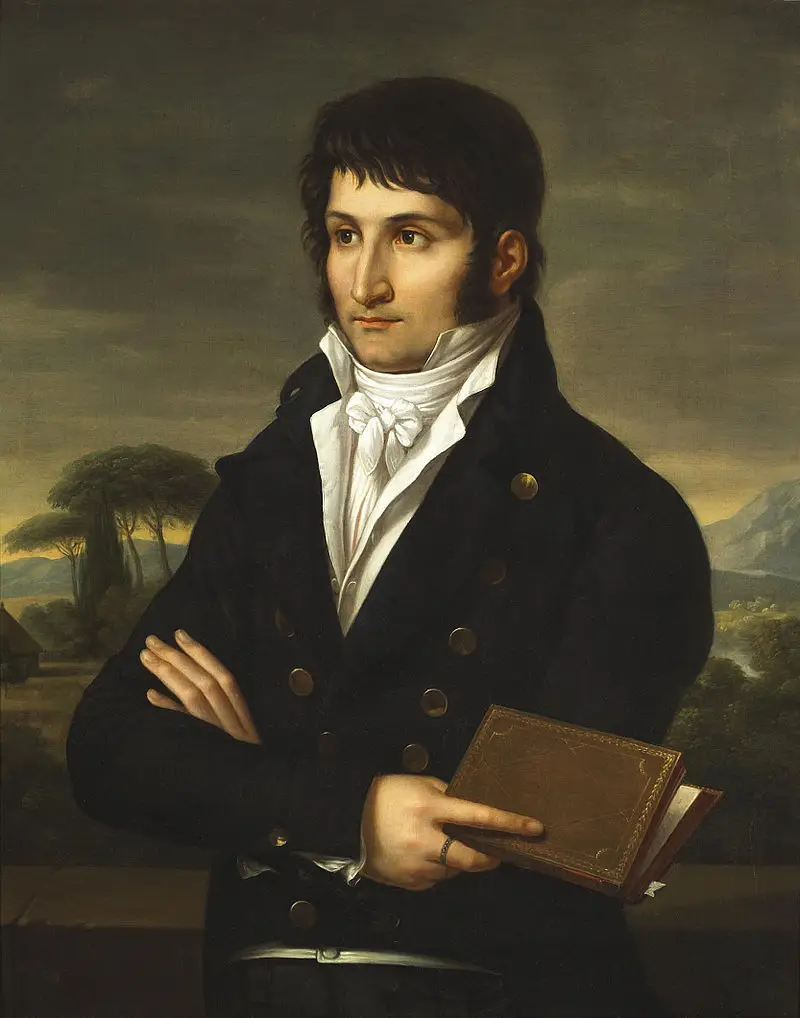
Lucien Bonaparte in a portrait by François-Xavier Fabre
It was the deputies of the Council of Five Hundred who gave Bonaparte a particularly “warm” welcome, greeting him with shouts of “Outside the law!” (Hors la loi). Everyone remembered that in the Convention this phrase meant a death sentence. Always brave on the battlefield, Bonaparte suddenly lost heart and was even close to fainting.
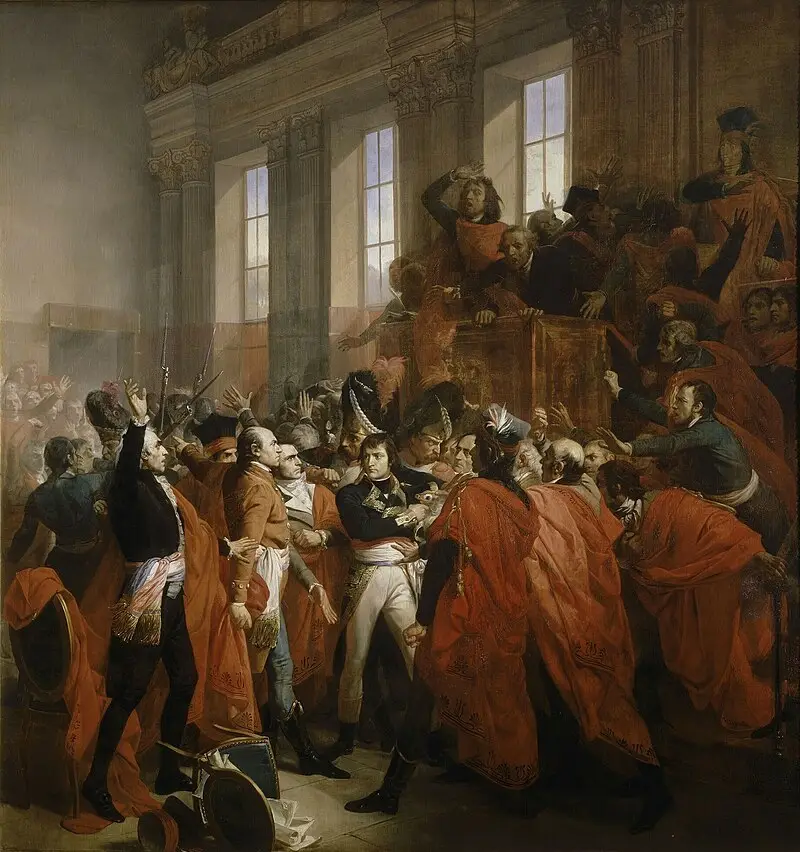
F. Bouchot. General Bonaparte in the Council of Five Hundred
Augereau, at the head of the grenadiers, had to be literally saved from the enraged deputies of both Napoleon and Lucien Bonaparte. They managed to be led out into the courtyard, where Sieyès calmly said to Napoleon:
Lucien, who retained his presence of mind, as Chairman of the Council of Five Hundred, addressed the soldiers who did not quite understand what was happening, with an appeal to “free the majority of the Assembly from a bunch of madmen.” “Mad” in this context is not an insult, but an accusation: this is how the most radical and extremist-minded deputies were called in the Convention, against whom, in the end, even the Jacobins spoke out.
Now it became clear to the soldiers that the radicals of the Council of Five Hundred were carrying out a coup d'etat, wanting to return France to the time of the Great Terror.
The decisive order was given by the dashing grunt Joachim Murat, his words were included in all textbooks stories:
The grenadiers carried out this order literally - the deputies left the hall not only through the doors, but also through the windows.
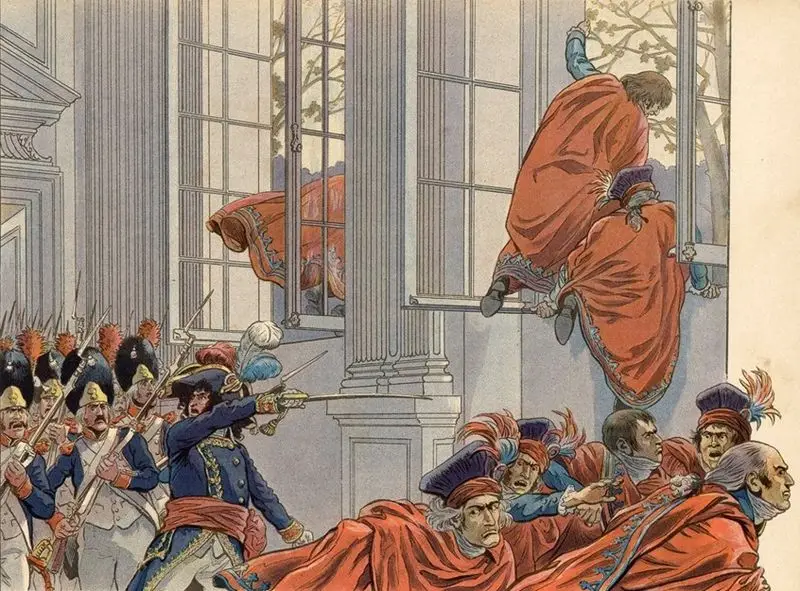
Murat disperses the Council of Five Hundred
Some managed to escape, others were caught by the soldiers and returned to the hall. Already resignedly, without even reading, they signed the document dissolving the Council of Elders and the Council of Five Hundred. The Constitution of the Third Year of the Republic was also abolished. Power in the state was transferred to three consuls - Bonaparte, Sieyès and Roger-Ducos.
But very soon Bonaparte told Sieyès that such a gifted person should not be distracted from truly important matters, such as drafting a new Constitution. And therefore, he should delegate the worries about small everyday affairs to less outstanding people. Napoleon advised that the Constitution be written in such a way “to be short and incomprehensible.” But he himself later significantly reworked the project prepared by Sieyès.
Napoleon did not explain anything to the other “consul for an hour” - Roger-Ducos - he simply announced his resignation. He appointed Cambaceres and Lebrun as new consuls, immediately making it clear that they were his subordinates.
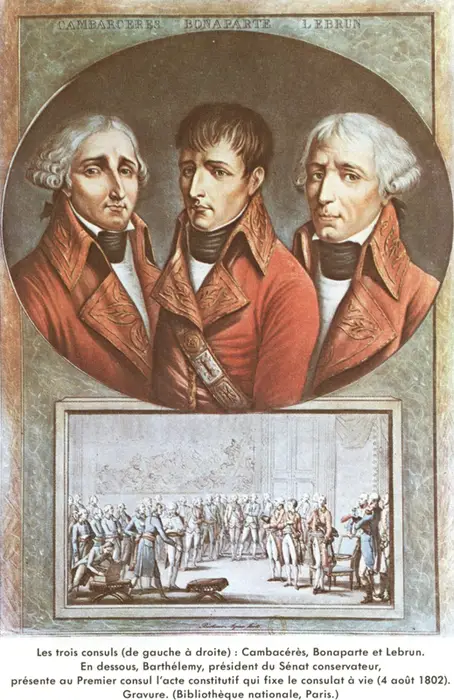
Jean Duplessis-Berto. Portrait of three consuls
Napoleon nevertheless thanked Sieyès, although not too generously: he gave the Crosne estate, contributed to his appointment as president of the Senate and election to the Academy of Sciences. In 1808 he gave him the title of count of his empire. But the rootless marshals of Bonaparte (as well as General Junot) became dukes. The people then sang a song with the following words:
The Republic was given a day of magnificent funeral;
And Bonaparte gave Sieyes the estate of Crone,
How I repaid him and indicated the place.”
Sieyès during the imperial period and in the last years of his life
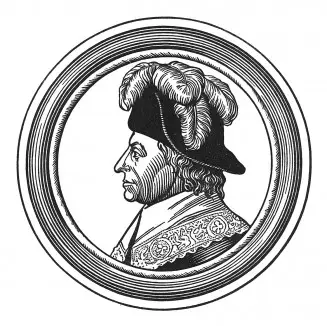
Sieyès in an illustration for the play “Napoleon” by S. Guitry, 1955.
After Napoleon's coronation, Sieyès rarely interfered in political affairs. Nevertheless, Bonaparte, who returned from the island of Elba, remembered him and made him a member of the House of Peers. Because of this, after the second Bourbon restoration, Sieyès was expelled from the Academy of Sciences and was forced to move to Brussels.
He returned to his homeland after the July Revolution of 1830. One of the last giants of the Great French Revolution, who remembered Danton, Marat, Saint-Just, Mirabeau, no longer played any role in the political life of the country. Of the members of the Committee of Public Safety, only Bertrand Barère survived him. Shortly before his death, Sieyès's mind became clouded, and they claim that he often gave very strange instructions to his servants. The most memorable thing for everyone was this:
Sieyès died in Paris in 1836 at the age of 88. His grave can be seen in the famous Père Lachaise cemetery.
Information